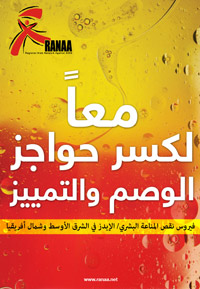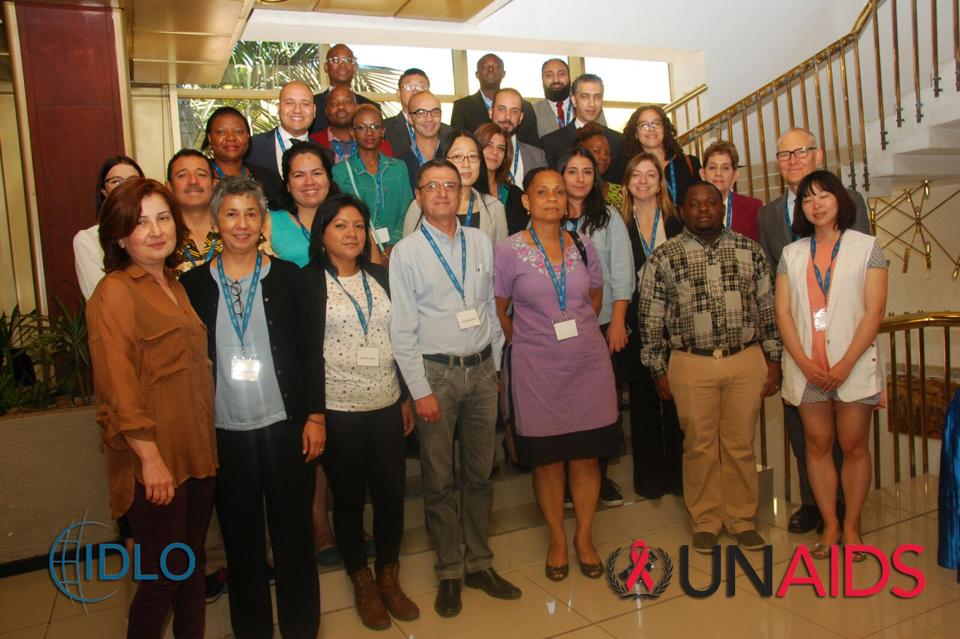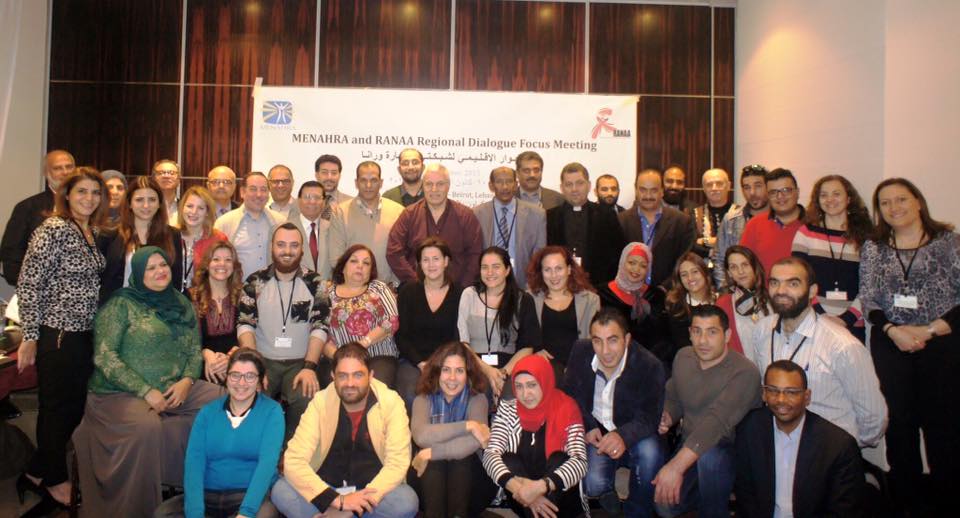The Regional/Arab Network Against AIDS (RANAA) and the Middle East and North Africa Harm Reduction Association (MENAHRA) attended the 37th meeting of the Programme Coordinating Board (PCB) held in Geneva on the 26-27 & 28 October 2015.
At this meeting the PCB adopted a new strategy to end the AIDS epidemic as a public health threat by 2030. With a universal agenda, firmly grounded in evidence and right- based approaches, the strategy maps out the UNAIDS Fast-Track approach to accelerate the AIDS response over the next five years to reach critical HIV prevention, treatment targets and achieve zero discrimination.
RANAA and MENAHRA highlighted the challenges and the humanitarian crisis that the MENA region is facing, pointing out that there is still unfinished business and people are still left behind, and it is a shared responsibility for an equitable and sustainable HIV response. Some of the CSOs recommendations were included in the PCB final decisions.
RANAA’s President and MENAHRA’s Executive Director requested at the last plenary session that MENA region has a permanent representation at the NGO delegation to the UNAIDS PCB.
Intervention made on the 26th of October 2015

Mr. Chair,
Thank you and thanks to UNAIDS for the invitation, as you know there is no specific representation for CSOs from MENA region at the PCB meeting. We are taking this opportunity as CSOs from MENA the Regional/Arab Network against AIDS (RANAA) & the Middle East and North Africa Harm Reduction Association (MENAHRA) to share with the distinguished audience a brief on the situation in our region.
We also would like to congratulate UNAIDS and the secretariat for the efforts you are deploying and the process that led us to this comprehensive strategy. We are pleased that we took part in this consultative process in the region and at the national levels.
With the support of UNAIDS SRT MENA, we have been actively part in the development of the Arab AIDS strategy that has been developed by the League of Arab States and approved by the Arab Ministers of Health and the Arab Parliament. We also succeeded to sign an MOU between the LAS & the RANAA to implement the strategy at different levels that goes in line with the strategic orientations of the UNAIDS strategy.
Mr. Chair, Distinguished Audience,
In MENA region we are witnessing some positive changes, Harm Reduction and services addressing IDUs have been increased since few years, some countries have adopted partially or totally the harm reduction strategy.
We are also witnessing the evolvement of the community groups’ organizations. I can mention MENARosa for women living with HIV, M Coalition the MENA network of MSM, and the MENA network of People who Use Drugs (MENANPUD). These organizations still need technical, Institutional and financial support to be partners in the response to HIV
.
Having said that, we can also say that unfortunately, in MENA there is still unfinished business; there are still people left behind!
• MENA region is ranked among the 2 regions in the world with fastest growing epidemic
• The MENA region is the lowest region in ART coverage, not more than 14%. this is in addition to a scarce to absence of data
• We are facing massive humanitarian crises. 16 out of 23 countries are facing security problems and unstable situation. The huge number of refugees, migrants and displaced populations are putting most of the countries of the region in a vulnerable situation where HIV is not on the decision makers’ agenda.
• Stigma & Discrimination, gender inequality, the punitive laws and legal barriers along with some cultural and social practices are preventing some specific groups (women, KPs, etc.) from seeking services… factors that put these groups at a high risk and leads to human rights violation.
• In the MENA we have very limited political commitment which is clearly shown by the lack of services and domestic funding
• MENA is not at the top ten of the donors’ agenda as well. The eligibility criteria of some organizations must be reviewed towards more inclusion and support.
Michel Sidibe once said that MENA can be the first region to eradicate HIV. This is very encouraging. We are wondering, how we can reach this objective if we do not invest in the eradication.
Don’t leave the MENA region behind.
Elie AARAJ
RANAA President
MENAHRA Executive Director
Intervention made under the thematic segment on the 27th of October 2015
Mr. Chair,
We would like to thank UNAIDS again for giving the CSOs from MENA region the opportunity to participate in this meeting.
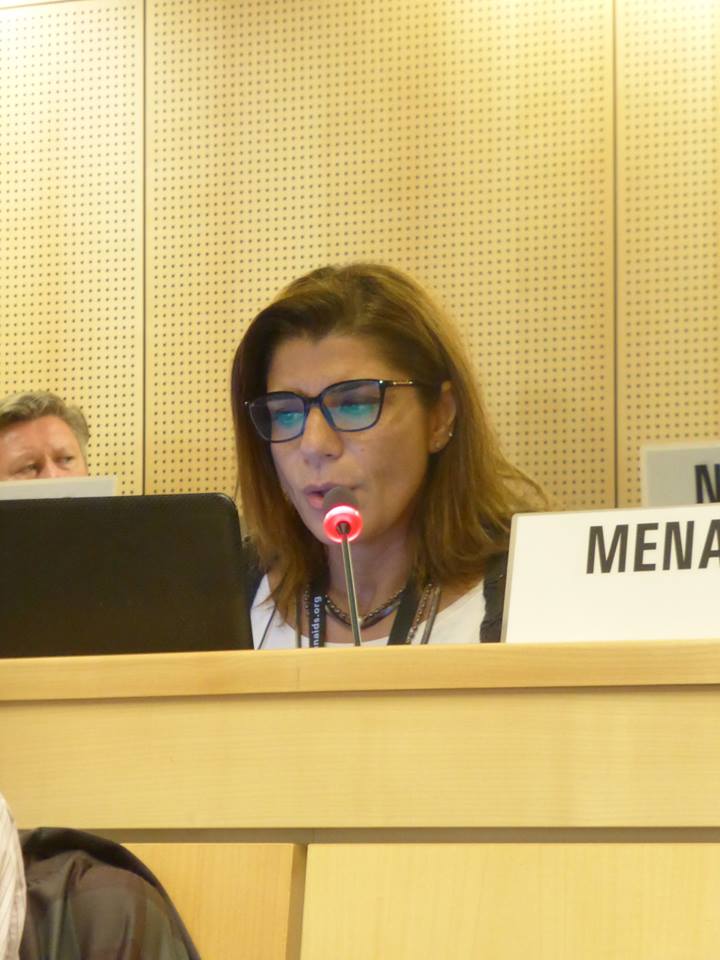
Mr. Chair and esteemed delegates,
Humanitarian crisis topic is one of the core challenging situations in MENA region, being the world's largest producer and host of forced displacement. With Syria's ongoing war, Iraq, Libya, Palestine, Somalia, Sudan and Yemen, the number of refugees and internally displaced people rise to unprecedented levels. These circumstances also imply human trafficking, rape, sexual abuse and violence that affect mostly vulnerable groups and KPs.
This situation affects both the hosting community and the displaced population.
In this context, RANAA and UNAIDS RST MENA organized, in collaboration with the General Secretariat of the League of Arab States and UNHCR, with the active participation and support of the UNAIDS Deputy Executive Director, the first Regional Consultation on Strengthening National Capacities for a Resilient HIV Response in MENA Countries. In this consultation, we gathered representatives of National AIDS program managers and CSOs from affected countries by humanitarian crises, and regional and international organizations and institutions.
The main objectives were to discuss the challenges and to agree on the programmatic priorities and technical support needs for fast-tracking the AIDS response in these countries.
Mr. Chair,
This consultation was organized to follow up the recommendations of the last PCB held in June. The general outputs of this consultation go in line with the UNAIDS recommendations mentioned under the thematic segment.
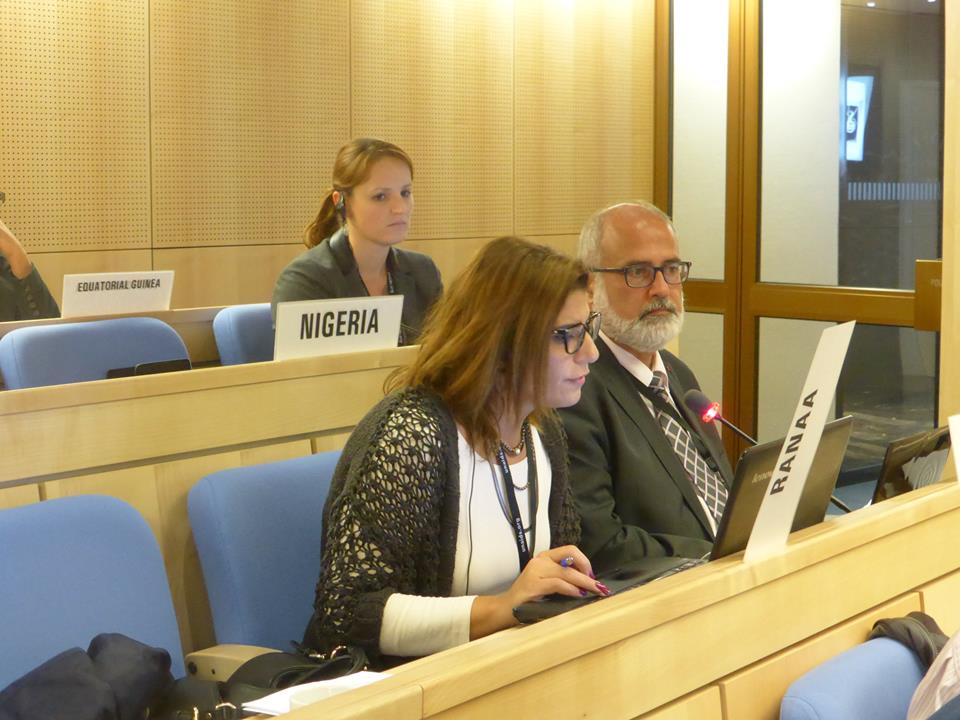
We would wish to highlight 7 key recommendations:
1- have better strategic information and understanding of the needs of population affected by humanitarian emergencies
2- Support comprehensive and integrated approaches and packages of services
3- Invest in capacity building and strengthening of service providers and CSOs in service delivery
4- In low prevalence and high stigma settings such as in MENA, we need to address countries that are highly affected by displacement and emerging crises and the need to look for strategic entry points for integration issues of HIV within the existing national and humanitarian response.
5- Make sure to maintain equity in service delivery between hosting community and displaced populations. Failing to do that might increase stigma and discrimination
6- Promoting national and regional collaboration between UN agencies, CSOs, governmental bodies and other stakeholders is very crucial, but there is a need to ensure coordination and Networking among involved stakeholders to have a clear division of labor and to minimize duplication of efforts.
7- Last but not least, for not affecting the achievement of the fast track goals in the UNAIDS 2016-2020 strategy, we recommend to have a focused intervention regarding humanitarian crisis which implies a specific strategic plan, and fundraising plan where all above needs and recommendations fall under.
It is a shared responsibility for not leaving anyone behind, and as CSOs we will do our best with UNAIDS and all partners to address these challenges in our region.
Thank you
Golda EID
RANAA Executive Director

